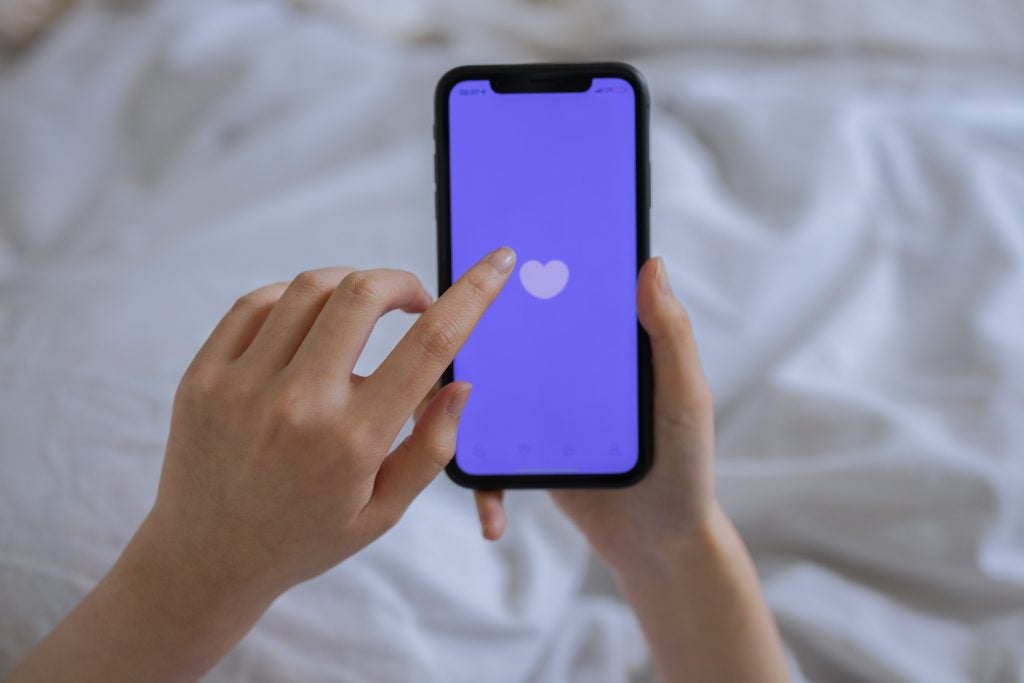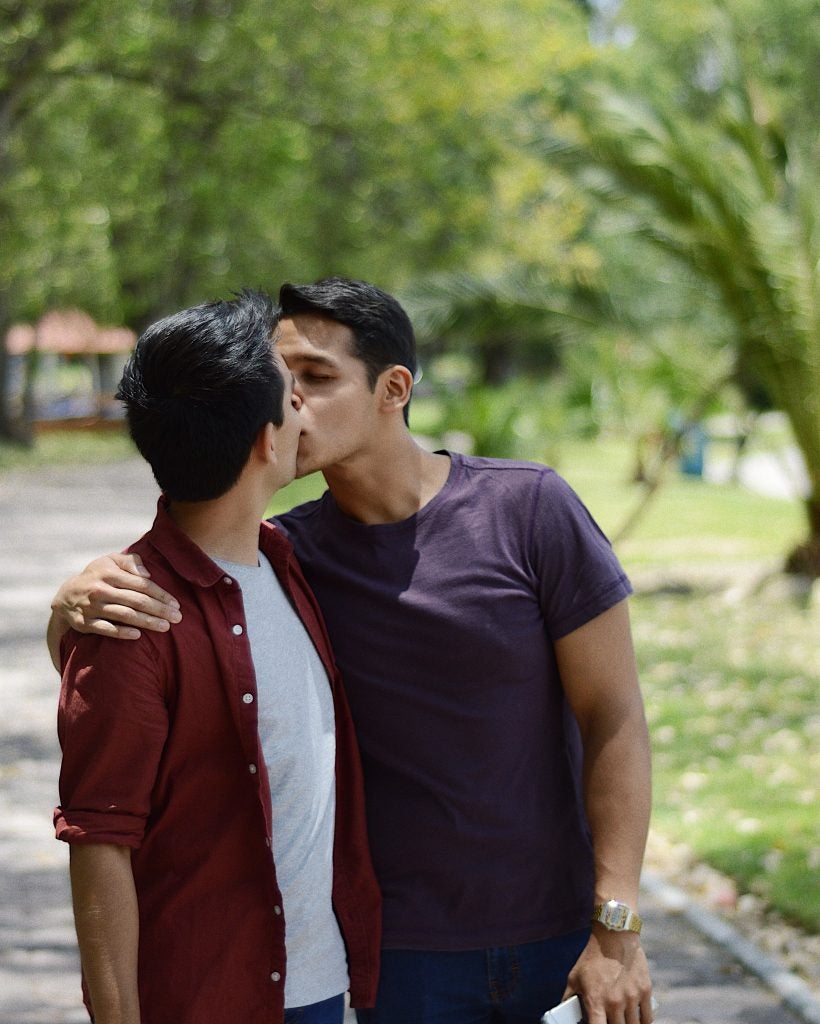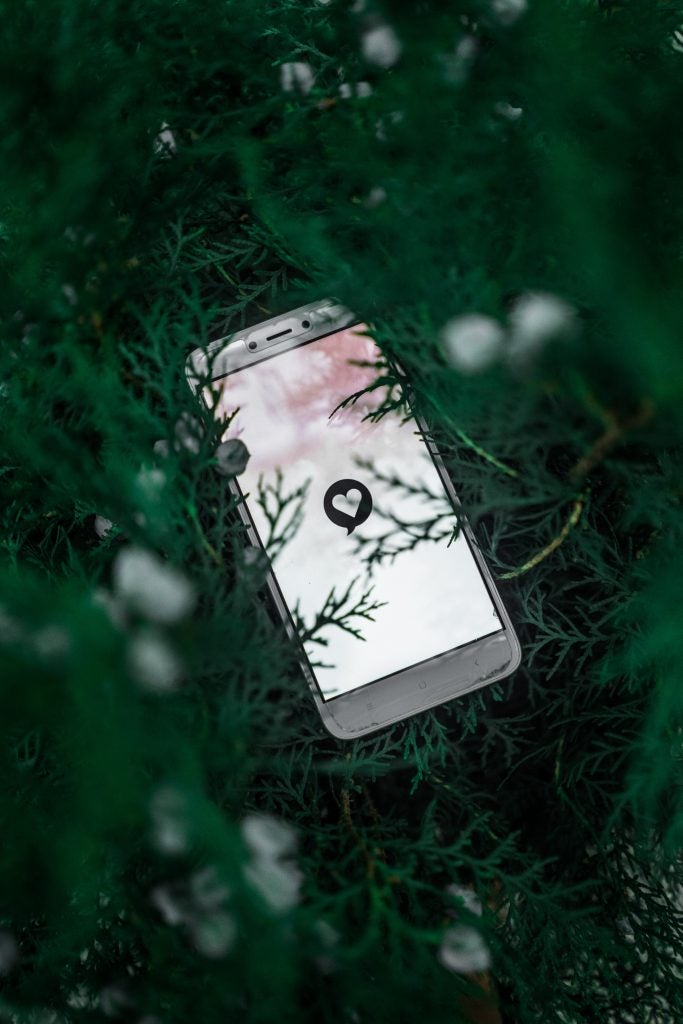
In the past decade or so, technology has revolutionized the way that men who have sex with men (MSM) can connect and meet with potential partners. This new territory is highly digital, and functions largely on smartphone applications which use the phone’s GPS signal to find other gay and bisexual app users in the surrounding areas. The prevalence of such apps has become widespread in over 196 countries, with a significant user base belonging to Grindr which has two million daily users.1 After downloading Grindr or another similar application, users create a profile with basic information about themselves and have the option to upload a picture. Users are then directed to a homepage through which they can view dozens of MSM nearby, and initiate a conversation with any of them; this often results in conversations that include sexting. On Grindr and apps similar to those described above, one can even enable filters to narrow down the list of potential partners by ethnicity, age, height, weight, relationship preference (date, chat, or looking to meet “right now”, etc.) or even sexual position.1 Such applications have largely come to replace the more public practice of cruising gay bars, bathhouses, or public restrooms; the apps function by facilitating sexual interactions between MSM as well as nonsexual relationships amongst users. In this article, we examine the expansive digital network of MSM created by gay-male specific applications. Through our research, we hope to elucidate more about the prevalence of such app usage internationally, its perceived benefits, and other risk factors for the individuals who use them as well as a few tips to safely navigate this digital space.
Table of Contents
Widespread Use
Applications have become immensely popular amongst MSM, so in this section we focus on their use in the United States as well as in other countries.

In the United States, large cities such as New York, Los Angeles, and San Francisco have expansive digital networks of men who use such applications frequently. One study conducted in Atlanta found that, on average, respondents had active profiles on about 3.1 applications. In this same sample, men reported opening these applications at an average rate of 8.38 times, resulting in 1.3 hours on applications each day.2 An alternate study in Los Angeles found that approximately half of the 195 users surveyed logged on to Grindr five times or more per day.7 Another study conducted in Washington D.C. found that 63.6% of the 379 respondents had used an application to find a sexual partner in the past year.4 These results suggest that such applications are an integral element in regular, daily partner seeking amongst MSM. One no longer needs to leave the comfort of their home to cruise the surrounding area for potential partners or talk with other gay or bisexual men. The widespread use of geo-social networking applications like Grindr is especially common in urban areas across the globe and has changed the dating landscape amongst MSM.
Some cultures are less accepting of homosexuality than others; however, the taboo nature of gay sex in these societies potentially increases the appeal of gay-specific applications. In more conservative, rural areas, there is often little to no physical, queer spaces (gay bars, LGBTQ centers, etc.). The accessibility of applications is especially important in these instances. These applications can supplement this lack of physical space, fostering a digital community that often lies below the radar of heteronormative culture and allows for connections with other closeted, gay, or bisexual men. For example, in China, where homosexuality is legal but still taboo, the most popular gay dating app is called Blued. It has attracted 22 million users, making up 85% of China’s gay specific application market.5 Despite China’s history of government censorship, the gay application is lawfully utilized by millions. Similar applications are popular in other countries in which there is a greater intolerance of the LGBTQ community. Application users in countries like Pakistan, Saudi Arabia, and India, where homosexuality is illegal, might still use the application as one of the only avenues to overcome the obstacles of meeting potential partners in real life.5 We strongly caution users in more intolerant countries, as there is greater risk of being outed, taken advantage of, or even seriously harmed by someone met on Grindr. In India, Grindr blackmail victims are unfortunately common. In Pakistan, many LGBT sites have been banned, but Grindr is still widely used among MSM; a report mentioned that law enforcement is likely unaware of its widespread use.5 If you live in a country in which homosexuality is taboo or illegal, we recommend practicing extreme caution and not providing identity revealing details in early interactions on applications. In addition, we suggest that individuals meet in a public location before deciding to take things further with a potential partner. MSM dating applications have become popular across the globe but their usage in less tolerant countries remains controversial.
Benefits
In this section, we focus on the motivations for app usage; these can be considered as benefits that individuals believe such applications afford them.

In a study done of MSM by survey, 87% said they belonged to a social networking site, such as Grindr that was largely designed to enable sexual encounters. Seeking sexual gratification was the most commonly mentioned motivating factor in app usage.6 Users felt as though the applications streamlined the process of seeking sexual partners, benefitting from the ease of GPS technology to quickly find those nearest to the user. Such applications often allow users to “favorite” other users, enabling them to keep track of past or potential hook-ups.7 With this feature, the apps also provide the benefit of social connectivity. Individuals reported having “favorited” interests whom they subsequently interacted with in real life, whether it be at the gym, bar, or elsewhere.7 Users can relatedly connect with others based on “tribes” or subcultures of MSM, often based on body type such as skinny, white “twinks” or physically built, hairy “bears.” 7 This feature also connects individuals to a subgroup of MSM with which they can identify. The fact that one can easily connect with others similar to themselves allows for friendships or intimate relationships to originate through an application. Individuals who use these applications benefit by increasing their potential for sexual and social connections in the LGBTQ community; this in turn can be beneficial in helping to form a positive queer identity.
Similarly, other perceived benefits of such applications include the control of privacy, the ease of an only gay user base, and the transparency with which individuals use the apps. People who use such applications can tightly control the amount of information they provide about themselves; this affords users a certain anonymity and privacy. This fosters an environment that is inclusive of individuals who are not out of the closet or who might be criminalized for their sexuality in their country. Users can protect their identity by choosing not to upload a photo of themselves, contributing to their sense of safety in the all-MSM community. The all-MSM user base also provides the unique benefit of not having to ascertain another’s sexuality. This kind of environment mirrors that of a gay bar in which individuals can feel more comfortable approaching strangers. For this reason, the apps also function well for people who might be shy or insecure when interacting with other potential partners in person. In addition, the applications provide the opportunity to be clear about what you are looking for. As shown through Grindr’s options for “chat,” “friends,” “relationship,” “right now,” and “dates,” users can be completely transparent about their intentions. By being straightforward about what they are looking for, users can easily refine the list of potential partners and avoid any unfortunate miscommunications. Amongst some of the other benefits of such applications are their accessibility and mobility.7 Anyone can download one of many free MSM dating applications in countries around the globe and any number of the aforementioned factors might motivate one to do so.
Drawbacks
While it does provide benefits, the new digital territory also has drawbacks which can complicate and impact one’s experience of the applications.
First and foremost, the use of gay dating applications can affect one’s sexual risk behaviors and, potentially, one’s health. In a study conducted with 146 men in Los Angeles, researchers determined that nearly 20% of participants had engaged in unprotected anal intercourse with their last app met partner, while 71% participated in oral sex without a condom. This study concluded that young MSM who were familiar with and had used the app for at least one year were more likely to engage in unprotected anal intercourse with another partner met through Grindr.3 This conclusion suggests that extended Grindr use leads to more frequent involvement in unprotected sex. Unprotected anal intercourse in the context of a hook-up is among some of the riskiest sexual behaviors. We recommend always using a condom and lubrication to protect against sexually transmitted infections as well as transmission of HIV/AIDS. Talking to your sexual partner about their HIV status before engaging in intercourse is a good idea; open and honest communication can help to reduce your sexual risk. If one enjoys multiple sexual partners through means of an MSM dating app, they might consider talking to their doctor about PrEP ,a pill taken daily to protect against HIV/AIDS, to protect themselves. In every sexual interaction, one should acknowledge the sexual risk involved and make efforts to reduce it for their and their partner’s physical well-being.

In addition to increasing sexual risk behavior, applications like Grindr have been known to be a particularly volatile environment in terms of sexual racism. Sexual racism is often described as “discrimination between potential sexual or romantic partners on the basis of perceived racial identity.” 8 Sexual racism often manifests itself as preferences in one’s MSM dating profile. “Not attracted to Asians” or perhaps “white boys only” serve as good examples of sexually racist language. In a study conducted on 2,177 Australian MSM, 96% of the men reported seeing sexually racist profiles, while 58% felt they had been discriminated against because of race. This issue is extremely controversial when coupled with the fact that 64% of participants felt it was OK to indicate a racial preference online.8 Here at SexInfo, we feel it is detrimental to generalize based on race as it can lead to the perpetuation of harmful stereotypes. Instead, one should be open to the possibility of connection with anyone, rather than limiting yourself and perpetuating racist attitudes. The prevalence of sexual racism on MSM applications can certainly be considered one of the more harmful aspects.
Similarly, applications might allow for a level of anonymity, which in conjunction with misogyny and traditional standards of masculinity, can make the environment toxic. In a study of French MSM, researchers found that traditional manners were sometimes ignored. For example, instead of politely expressing disinterest, individuals might opt to not respond to someone they perceive as “unattractive.” 9 This sort of behavior is enabled by the anonymity provided by the applications and can be damaging to one’s self esteem. Another study focused on Grindr users in Brazil who expressed anti-effeminate attitudes. Internalized homophobia and traditional notions of masculinity often lead to hostility towards less masculine men. This study found that even though men felt they had experienced discrimination themselves, they still sought out men that fit a masculine ideal. Once again, misogyny is often expressed in superficial “preferences” on people’s profiles.10 Unfortunately, individuals who are not as traditionally masculine or who struggle to maintain a positive self image might find these applications too hostile of an environment. This mistreatment of less attractive or less masculine men is in contradiction to some preconceptions of the LGBTQ community as being inclusive and welcoming. The aggressive environment can be considered one of the major drawbacks of MSM applications and the community they foster.
Tips for Navigating MSM Apps
- Be wary about what information you reveal about yourself-whether it is it through messages, pictures, or locations.
- Remember that you are likely talking to a human being. Politeness and tact are just as valuable through the application as they are in person.
- Establish boundaries with yourself and with potential partners. Consent should always be a priority and individual acts should be discussed between partners beforehand.
- Meet with potential partners in public places and consider letting a reliable friend know where you are going to meet someone you might not have known before..
- Remember that applications and the real world are not mutually exclusive. You might see individuals online that you know from real life. Or, you might run into someone in real life that you recognize from online.
- Always use protection. A condom and adequate lubrication are absolutely necessary if you are engaging in anal sex.
- Be open to possibilities. Applications provide a lot of opportunities to foster connections and explore sexuality, and this can be an enriching experience for a queer identity.
In less than a decade, the MSM dating landscape has been revolutionized by these applications. Their popularity and accessibility has led to widespread use in countries all over the world. This raises new opportunities as well as challenges for individuals who use the applications. One can gain sexual and social gratification in the digital network of MSM, especially if there is a lack of physical spaces for MSM to meet. The digital setting provides a certain anonymity that acts as a double-edged sword-protecting people’s identities, but also enabling users to treat others disrespectfully or not as politely as they would in person. We hope that individuals who use these applications weigh the pros and cons of such apps based on their individual circumstances. When used safely and respectfully, these applications can be an enriching experience for individuals seeking more connections to the LGBTQ community around them. We hope this article helped you to better understand the environment of MSM applications; if you have further questions on this topic or sex in general, remember to use our Ask the Sexperts feature.
References
- Taylor, Samuel H, et al. “Extending the Internet-Enhanced Self-Disclosure Hypothesis.” Social Consequences of Grindr Use, ACM, May 2017, dl.acm.org/citation.cfm?id=3025453.3025775.
- Goedel, William C, and Dustin T Duncan. “Geosocial-Networking App Usage Patterns of Gay, Bisexual, and Other Men Who Have Sex With Men: Survey Among Users of Grindr, A Mobile Dating App.” Ed. Gunther Eysenbach. JMIR Public Health and Surveillance 1.1 (2015): e4. PMC. Web. 13 October 2017.
- Winetrobe, H., Rice, E., Bauermeister, J., Petering, R., & Holloway, I. (2014). Associations of unprotected anal intercourse with Grindr-met partners among Grindr-using young men who have sex with men in Los Angeles. AIDS Care, 1-6.
- Phillips, G., Magnus, M., Kuo, I., Rawls, A., Peterson, J., Jia, Y., . . . Greenberg, A. (2014). Use of Geosocial Networking (GSN) Mobile Phone Applications to Find Men for Sex by Men Who Have Sex with Men (MSM) in Washington, DC. AIDS and Behavior, 18(9), 1630-1637.
- Bengali, S., & Kaiman, J. (2016, January 17). When gay sex is taboo, apps open a door. Los Angeles Times, p. A3.
- Gudelunas, D. (2012). There’s an App for that: The Uses and Gratifications of Online Social Networks for Gay Men. Sexuality & Culture, 16(4), 347-365.
- Miller, B. (2015). “They’re the modern-day gay bar”: Exploring the uses and gratifications of social networks for men who have sex with men. Computers in Human Behavior, 51, 476-482.
- Callander, D., Newman, C., & Holt, E. (2015). Is Sexual Racism Really Racism? Distinguishing Attitudes Toward Sexual Racism and Generic Racism Among Gay and Bisexual Men. Archives of Sexual Behavior,44(7), 1991-2000.
- Batiste, D. (2013). ‘O feet away’: The queer cartography of French gay men’s geo-social media use. Anthropological Journal of European Cultures, 22(2), 111-132.
- Baydoun, Mahamoud. ““No for Sissies”: Anti-Effeminacy Among Users of Grindr in…” The Journal of Sexual Medicine, May 2017
- Quotes gathered by author from undergraduate MSM at the University of California, Santa Barbara
Last Updated: 26 October 2017.
